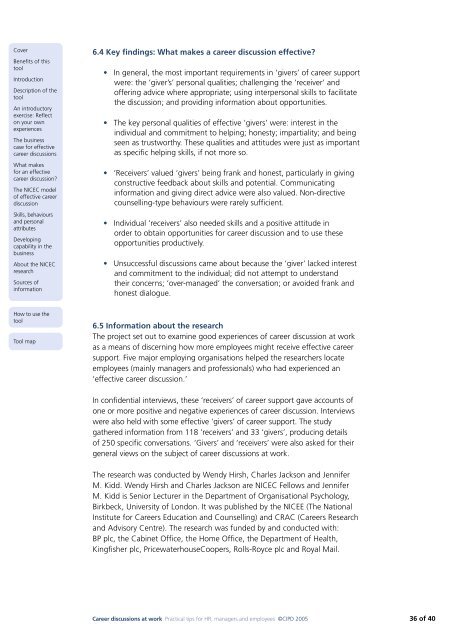Career Discussions at Work, Practical Tips for - CIPD
Career Discussions at Work, Practical Tips for - CIPD
Career Discussions at Work, Practical Tips for - CIPD
Create successful ePaper yourself
Turn your PDF publications into a flip-book with our unique Google optimized e-Paper software.
Cover<br />
Benefits of this<br />
tool<br />
Introduction<br />
Description of the<br />
tool<br />
An introductory<br />
exercise: Reflect<br />
on your own<br />
experiences<br />
The business<br />
case <strong>for</strong> effective<br />
career discussions<br />
Wh<strong>at</strong> makes<br />
<strong>for</strong> an effective<br />
career discussion<br />
The NICEC model<br />
of effective career<br />
discussion<br />
Skills, behaviours<br />
and personal<br />
<strong>at</strong>tributes<br />
Developing<br />
capability in the<br />
business<br />
About the NICEC<br />
research<br />
Sources of<br />
in<strong>for</strong>m<strong>at</strong>ion<br />
6.4 Key findings: Wh<strong>at</strong> makes a career discussion effective<br />
• In general, the most important requirements in ‘givers’ of career support<br />
were: the ‘giver’s’ personal qualities; challenging the ‘receiver’ and<br />
offering advice where appropri<strong>at</strong>e; using interpersonal skills to facilit<strong>at</strong>e<br />
the discussion; and providing in<strong>for</strong>m<strong>at</strong>ion about opportunities.<br />
• The key personal qualities of effective ‘givers’ were: interest in the<br />
individual and commitment to helping; honesty; impartiality; and being<br />
seen as trustworthy. These qualities and <strong>at</strong>titudes were just as important<br />
as specific helping skills, if not more so.<br />
• ‘Receivers’ valued ‘givers’ being frank and honest, particularly in giving<br />
constructive feedback about skills and potential. Communic<strong>at</strong>ing<br />
in<strong>for</strong>m<strong>at</strong>ion and giving direct advice were also valued. Non-directive<br />
counselling-type behaviours were rarely sufficient.<br />
• Individual ‘receivers’ also needed skills and a positive <strong>at</strong>titude in<br />
order to obtain opportunities <strong>for</strong> career discussion and to use these<br />
opportunities productively.<br />
• Unsuccessful discussions came about because the ‘giver’ lacked interest<br />
and commitment to the individual; did not <strong>at</strong>tempt to understand<br />
their concerns; ‘over-managed’ the convers<strong>at</strong>ion; or avoided frank and<br />
honest dialogue.<br />
How to use the<br />
tool<br />
Tool map<br />
6.5 In<strong>for</strong>m<strong>at</strong>ion about the research<br />
The project set out to examine good experiences of career discussion <strong>at</strong> work<br />
as a means of discerning how more employees might receive effective career<br />
support. Five major employing organis<strong>at</strong>ions helped the researchers loc<strong>at</strong>e<br />
employees (mainly managers and professionals) who had experienced an<br />
‘effective career discussion.’<br />
In confidential interviews, these ‘receivers’ of career support gave accounts of<br />
one or more positive and neg<strong>at</strong>ive experiences of career discussion. Interviews<br />
were also held with some effective ‘givers’ of career support. The study<br />
g<strong>at</strong>hered in<strong>for</strong>m<strong>at</strong>ion from 118 ‘receivers’ and 33 ‘givers’, producing details<br />
of 250 specific convers<strong>at</strong>ions. ‘Givers’ and ‘receivers’ were also asked <strong>for</strong> their<br />
general views on the subject of career discussions <strong>at</strong> work.<br />
The research was conducted by Wendy Hirsh, Charles Jackson and Jennifer<br />
M. Kidd. Wendy Hirsh and Charles Jackson are NICEC Fellows and Jennifer<br />
M. Kidd is Senior Lecturer in the Department of Organis<strong>at</strong>ional Psychology,<br />
Birkbeck, University of London. It was published by the NICEE (The N<strong>at</strong>ional<br />
Institute <strong>for</strong> <strong>Career</strong>s Educ<strong>at</strong>ion and Counselling) and CRAC (<strong>Career</strong>s Research<br />
and Advisory Centre). The research was funded by and conducted with:<br />
BP plc, the Cabinet Office, the Home Office, the Department of Health,<br />
Kingfisher plc, Pricew<strong>at</strong>erhouseCoopers, Rolls-Royce plc and Royal Mail.<br />
<strong>Career</strong> discussions <strong>at</strong> work <strong>Practical</strong> tips <strong>for</strong> HR, managers and employees ©<strong>CIPD</strong> 2005<br />
36 of 40

















